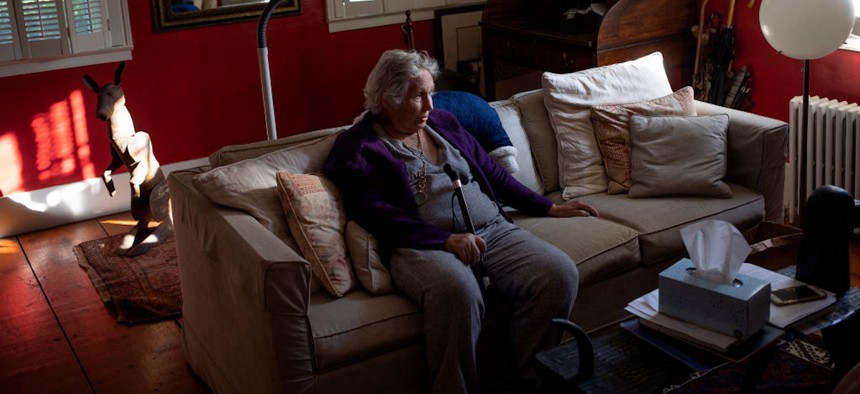County supports its aging residents by focusing on family caregivers

Cynthia Crawford, 87, despite a stroke and increasing signs of dementia, is trying to hold on and live her last few years in her own home on July 1, 2021, in the village of Stonington, Connecticut. It is a difficult decision because she requires supervision and care with daily tasks. Andrew Lichtenstein/Corbis via Getty Images
To ensure its older adults receive quality care, Fairfax County, Virginia, steps up services for their families.
Family caregivers help bathe loved ones, prepare their food, maintain their homes, drive them to medical appointments, provide companionship, and the list goes on. They devote their time, money and livelihood to fill gaps in the direct care workforce to help older adults age in place. Recognizing caregivers’ importance, policymakers are asking: Are we taking care of caregivers?
“It’s estimated that there are nearly 53 million adults who provide support to a family member or friend in the U.S.,” Greg Link, director of the Office of Supportive Caregiver Services at the federal Administration for Community Living said at a recent webinar. But family caregiving is often invisible, unpaid work, because most people consider helping out family members a natural thing to do.
However, caregiving requires far more than an occasional act of kindness. It’s expensive to take on the responsibilities for medical treatment, transportation and other activities related to home care. Plus, the time commitment can force caregivers to choose between working and tending to their family members. The stress of providing care can also take a toll on caregivers’ mental health, potentially impacting the treatment that their family member receives.
“We have to mitigate those risks,” Link said during the webinar hosted by the National Association of Counties. Policymakers must recognize individuals who help their families as caregivers deserve the supportive services and resources they need to continue providing care for their family members.
Counties are in a unique position to help family caregivers. They provide a safety net in emergencies and collaborate with government departments, community organizations and other stakeholders, to drive the delivery of assistive services. They step up, for instance, to offer residents shelter during natural disasters, distribute health products and services through local clinics and protect communities through public safety agencies.
Now counties are ramping up efforts to address their aging population with a focus on supporting family caregivers. In a new action guide NACo outlines ways counties can raise public awareness and improve services for aging adults and their caregivers.
One recommendation calls for local governments to partner with community-based organizations that can help supplement family members’ caregiving efforts.
The Fairfax County, Virginia, family caregiver unit, for example, partners with Inova, the local health care system, and the state-designated area agency on aging to offer in-home caregiving and volunteer-based respite programs, said Allegra Joffe, supervisor of the county’s Area Agency on Aging’s Caregiver and Support Services Unit.
“If a caregiver needs a few hours to get away to go grocery shopping or get a medical appointment done, we have volunteers who are able to come to the home and sit with their loved one and give them some companionship,” she said.
The county also operates four adult day health care centers, where older adults can participate in fall prevention exercises, practice mental and memory skills through games and other activities and find social and spiritual connections, for example. The centers are staffed by occupational and physical therapists, and they offer transportation services and host group outings to the mall, the zoo and other local sites and events.
For older adults with dementia or a cognitive impairment the centers provide respite care during the day, giving their caregivers a break, Joffe said.
Fairfax County also offers support programs directly targeted to family caregivers. Caregivers can register for monthly webinars to learn, discuss and connect with each other about their work, Joffe said. Virtual sessions cover topics ranging from legal advice to practical suggestions on how caregivers can maintain their mental, physical or emotional well-being.
A 2022 community survey of about 3,000 older adults across Fairfax County, Fairfax and Falls Church, for example, found that 29% of respondents said caring for a family member was emotionally draining, 21% reported feeling financially encumbered and 22% cited physical challenges.
But for caregivers to take advantage of support services, they have to know they exist. Counties should use the same communications channels caregivers and older adults do to ensure they know about available services, NACo recommended. Counties can distribute caregiving-related information, for instance, at schools and local businesses as well as through social media and local news outlets.
Fairfax maintains a phone line for inquiries about aging, disability and caregiver resources. Calls are directed to master-level social workers who can also provide emotional support to callers who may need help navigating difficulties with caregiving, Joffe said.
Since the phone line is the “main-door” to the county’s aging and caregiver programs, she said, the county makes certain to include the number on government sites and printed materials distributed to community members, community-based organizations and various partners.
“The more we know and understand about family caregivers, the more we can do to develop services and supports that are best for them,” Link said.






